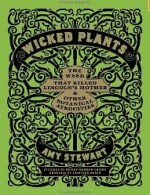 As soon as you see the cover of Amy Stewart’s book, Wicked Plants, you will suspect that it is “different” and you won’t be disappointed. Stewart tells her reader in her introduction that “If the book entertains, alarms, and enlightens” she has done her job. The book does not disappoint; it is entertaining, enlightening, and provides the kind of information that helps build guarded respect for plants.
As soon as you see the cover of Amy Stewart’s book, Wicked Plants, you will suspect that it is “different” and you won’t be disappointed. Stewart tells her reader in her introduction that “If the book entertains, alarms, and enlightens” she has done her job. The book does not disappoint; it is entertaining, enlightening, and provides the kind of information that helps build guarded respect for plants.
The material in the book is organized into two groups. The first group consists of sections on individual plants such as aconite, suicide tree, and oleander, and include an etching of the plant, history, and why the plant is considered wicked. The second group is made up of sections on a group of plants such as Psychedelic Plants, Weeds of Mass Destruction, and Botanical Crime Families. They include the significant characteristics of the group and a list of examples with brief descriptions. The two different groups are mixed together with the individual plant entries being most numerous and more entertaining.
The entertainment value of the book is enhanced by the fact that Stewart is a very good story teller. For example, the author Mark Bowden found his way into Somalia for researching his book, Black Hawk Down, by paying for the knat he displaced on the plane. Stewart goes on to tell us about the role of knat in Somalian life and the fact that the leaves lose their power in 48 hours making it hard for the police to get the required lab tests for carrying out effective drug busts. Other stories tell us about the Jamestown settlers and their encounter with jimsom weed, the Spanish conquestador’s use of coca to make the slaves work harder in the mines, and the use of plants in trials of ordeal.
Much useful and sometimes alarming information is included also. For example, oleander, a favorite landscaping plant in Southern California, can be deadly, celery can make people very sensitive to sunlight resulting in sunburn, and taking in fat or alcohol relieves burning due to the capsaicin in an habanero pepper. If you fly you might like to know that military pilots are advised not to consume tonic water more than 36 hours before flying because of the quinine content. Like nuts? Cashews are related to poison ivy and poison oak and if the nuts are improperly processed they can cause a severe rash.
You don’t have to be a gardener to enjoy this book, although there is a lot in it for an experienced gardener to learn. The style is easy going, conversational, and lively and the selection of material vast. For those wanting a reference book be aware that there is no index and while the etchings of the plants are pleasing they are not very helpful for plant identification. If you are looking for a good read, however, this is a fascinating book.
To buy Wicked Plants: The Weed That Killed Lincoln’s Mother and Other Botanical Atrocities from Amazon.com click here.